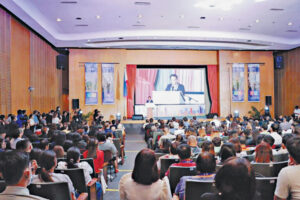The public sector is on the move to developing and transforming cities by promoting sustainable urbanization in the country. However, to ensure that innovative solutions towards sustainable cities effectively address an existing housing crisis and improve urban living, a nationwide action plan is necessary.
Such solutions and such a plan have begun to form as 1,300 urban development stakeholders from the national and local government, international and local nongovernment organizations, private sector, people’s organizations, and the academe gathered at the Philippine Urban Forum 2023, spearheaded by the Department of Human Settlements and Urban Development (DHSUD) and UN-Habitat Philippines, last Oct. 5-6, 2023 at the Philippine International Convention Center in Pasay City.
As the department reported on its official publication, The Shelter, the forum covered a diverse array of topics on land use and transport planning, green building and architecture, nature-based solutions, urban planning smart tools and technologies, integrated ecosystem management and financing options for LGUs for funding local projects on urban development, among others.
DHSUD Secretary Jose Rizalino L. Acuzar, in his keynote message at the event, stressed that the government’s Pambansang Pabahay Para sa Pilipino (4PH) program, more than addressing the housing backlog, seeks to create resilient and sustainable human settlements through urban development.
“We want to make sure that all our citizens have a safe place to live, that all our sectors, including those considered the smallest in society, the poorest of the poor, participate in the planning and development. Friends and colleagues in the industry, if you can see and notice one country and one spirit, I hope we include the poorest of the poor because they are the ones who need help the most,” Mr. Acuzar said in Filipino.
“As the secretary of DHSUD, our goal is to address not only the housing needs in our country. We also want to pay attention to planning urban development in our cities and communities. We also want to address slum blighted areas and to make sure that there are enough services and infrastructure especially in our cities,” he added.
The Philippine Information Agency reported that the insights and inferences that have stemmed from the knowledge exchange between the stakeholders in the two-day forum will serve as an additional anchor point of the Philippine New Urban Agenda which underpins the implementation of science-based policies in the urban development sector.
Building resilience
One of the forum’s discussions highlighted the importance of incorporating climate resilience into project designs for a more sustainable community. According to the Climate Change Commission (CCC), nature-based solutions are key to addressing climate change. These solutions include initiatives that protect, restore, and manage natural and semi-natural ecosystems.
“Our cities are facing unprecedented challenges due to the triple planetary crises of pollution, climate change, and biodiversity loss. Urban areas compound these crises but have a fundamental role to play in reducing greenhouse gas emissions through nature-based solutions that offer innovative ways to reduce carbon emissions and enhance overall climate resilience,” CCC Commissioner Rachel Anne S. Herrera was quoted as saying.
“We need to strengthen our efforts that would champion the benefits of nature-based solutions as viable measures in saving our future and our planet. Nature-based solutions are an integral piece to the whole picture of our efforts on climate action,” she added.
Financial sustainability
Another session highlighted the significance of financial sustainability in urban development, particularly cities. In the public sector’s view, the focus on financing is seen in resilient housing. This can be done through exploring socialized housing tax, strategic public-private partnerships, and updating market value schedules.
Also shared during the forum was the Strengthening Institutions and Empowering Localities Against Disasters and Climate Change (SHIELD) program, which is led by United Nations Development Program (UNDP) and was established to further support community resilience and sustainability in urban spaces.
This program aims to strengthen government initiatives to build community resilience by “collaborating with multiple stakeholders to unlock financing, invest in resilient development, and implement risk-informed and inclusive resilience actions.”
Also joining the forum, the Cities Development Initiative for Asia (CDIA) shared how they serve as a project preparation facility that can help cities prepare sustainable projects and attract more investments.
Other highlights
The Philippine Urban Forum also hosted training sessions tackling sustainable urban governance, covering topics such as creating climate-resilient and bankable projects and strategies for more inclusive urban development in the country.
The forum also featured an urban exhibit and gallery that showcased urban mobility projects from Mobility Awards, an organization that promotes smart and sustainable mobility. Mobility Awards emphasized through the exhibit the importance of interconnected urban governance and address inclusivity within communities.
The event concluded with the signing of the Memorandum of Understanding between the DHSUD and Department of Science and Technology (DoST).
According to the memorandum, developing integrated systems will be prioritized to automate land use and human settlement planning.
Further, it will help the local government units to create date-driven and risk-based strategies for building sustainable communities through the DHSUD’s PLANADO Program and DoST’s PlanSmart Ready to Rebuild application. — Angela Kiara S. Brillantes
